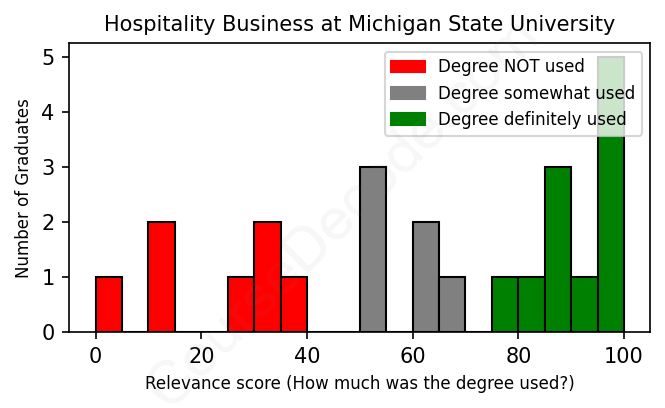
First, some facts. Of the Hospitality Business graduates from Michigan State University we've analyzed , here's how many have used (or NOT used) their degree in their career:

These are estimates based on AI analysis of 24 LinkedIn profiles (see below).
The verdict? Slightly below average. Overall, with an average relevance score of 62%, Hospitality Business graduates from Michigan State University have a slightly lower likelihood (-5%) of finding work in this field compared to the average graduate across all fields:
And for comparison, here's the chart for all profiles we've looked at across all degrees.
Also, after graduating, only 4% of these graduates have pursued further education other than another Bachelor's degree (such as a Masters degree or other), compared to the average across all profiles of 35%. This suggests a Bachelors degree is enough for most Hospitality Business graduates, and it's normal to look for work straight after graduation.
See the details:
|
Relevance score: 36% We think this person has NOT gone into a career related to their degree. We think this person has NOT gone into a career related to their degree.
DEGREE INFOGraduated in 2016 from Michigan State University with a Bachelor of Arts (B.A.) in Hospitality Business. No other secondary education since. JOB HISTORY SINCE GRADUATIONLeasing Specialist Macerich Oct 2017 - Oct 2022 Client Services Coordinator  Savills Oct 2022 - Present ABOUTNo information provided. |
The top 10 most common jobs done by the graduates we've analyzed (ranked most common to least) are:
From the data you provided, it seems that a significant number of graduates from the Hospitality Business program at Michigan State University have found jobs directly related to their field, especially in roles like Event Managers, Convention Coordinators, and various positions within hotels and restaurants. Many of the jobs, such as Front Desk Manager and Catering Sales Manager, directly utilize the skills and knowledge that are at the core of the Hospitality Business curriculum, like customer service, event planning, and operational management. Jobs in restaurants, hotels, and event planning companies heavily reinforce the concepts learned in the program, ensuring that graduates are applying their education in real-world settings.
However, there are also a fair number of graduates who have taken roles that aren’t very relevant to hospitality, ranging from administrative jobs to positions in finance and human resources. These positions may leverage some soft skills related to customer service or interpersonal communication, but they largely miss the opportunity to tap into the specialized training that comes from a hospitality-focused education. While it’s great to see some graduates taking diverse paths, it’s clear that a lot of them are still staying true to their hospitality roots, building careers that align closely with what they studied. This balance shows the fun versatility of a hospitality degree while also highlighting that not every job out there connects directly back to the hospitality industry.
Here is a visual representation of the most common words in job titles for Hospitality Business graduates (this is across all Hospitality Business graduates we've analyzed, not just those who went to Michigan State University):

Graduates from Michigan State University's Hospitality Business program generally have a solid starting point for their careers, often landing positions closely related to event planning and management right out of college. For instance, many recent grads kick off their careers as administrative assistants or event coordinators at hotels, banquet centers, or convention services, which helps them gain valuable experience in the industry. Over the years, it seems like they’re able to climb the ladder reasonably well, often progressing into roles such as sales managers, event production specialists, and even general managers. It's pretty impressive to see how some individuals, within just a few years, can transition into specialized roles like client relations or catering sales managers, putting their hospitality education to use effectively.
As time goes on, about five to ten years into their careers, many of these graduates still appear to be connected to the hospitality field. You’ll find some rising to substantial positions, like area managers or general managers at hotels and restaurants, while others have branched out into related areas, like event services or human resources within hospitality-related companies. Although there are a few who have moved into completely different industries, notably retail or corporate roles, the majority seem to find sustained success in hospitality, demonstrating that Michigan State University's program can really set them up for meaningful careers in the field. Overall, it looks like this degree offers a solid pathway for those passionate about hospitality.
Honestly, a Bachelor’s degree in Hospitality Business at Michigan State University can be a mix of both challenging and enjoyable. It’s definitely not the easiest degree out there, but it’s also not the most killer one either. You’ll dive into a variety of topics like management, marketing, and even finance, which can get pretty intense, especially if you're not great with numbers. However, there’s a lot of hands-on learning, group projects, and real-world experiences that make it engaging, so it’s not all lectures and textbooks. If you’re passionate about hospitality and willing to put in the effort, you'll probably find it a solid balance of fun and hard work!
Most commonly, in the LinkedIn profiles we've looked at, it takes people 4 years to finish a Bachelor degree in Hospitality Business.
When you look at the career paths of these Michigan State University Hospitality Business grads, it seems like they’re doing pretty well overall, but it varies a lot depending on their specific roles and industries. Many of them started off in entry-level positions or internships, which is normal, but a good chunk of them worked their way up to management roles fairly quickly, particularly in hotels and event planning—jobs that can pay decently if you're in the right place. For instance, those who became event managers or moved into sales roles at big names like Marriott and Hilton are likely raking in a better paycheck. On the flip side, some of the earlier positions like administrative assistant or server roles probably didn’t make as much, especially at the start. So yeah, it looks like most have found solid opportunities to earn decent money or build careers, but it ultimately depends on where they landed and how quickly they climbed the ladder!
Here is a visual representation of the most common words seen in the "about" section of LinkedIn profiles who have a Bachelor degree in Hospitality Business (this is across all Hospitality Business graduates we've analyzed, not just those who went to Michigan State University). This may or may not be useful:

Here are all colleges offering a Bachelor degree in Hospitality Business (ordered by the average relevance score of their Hospitality Business graduates, best to worst) where we have analyzed at least 10 of their graduates:
| College | Score | Count |
|---|---|---|
 Michigan State University Michigan State University
|
62 | 24 |